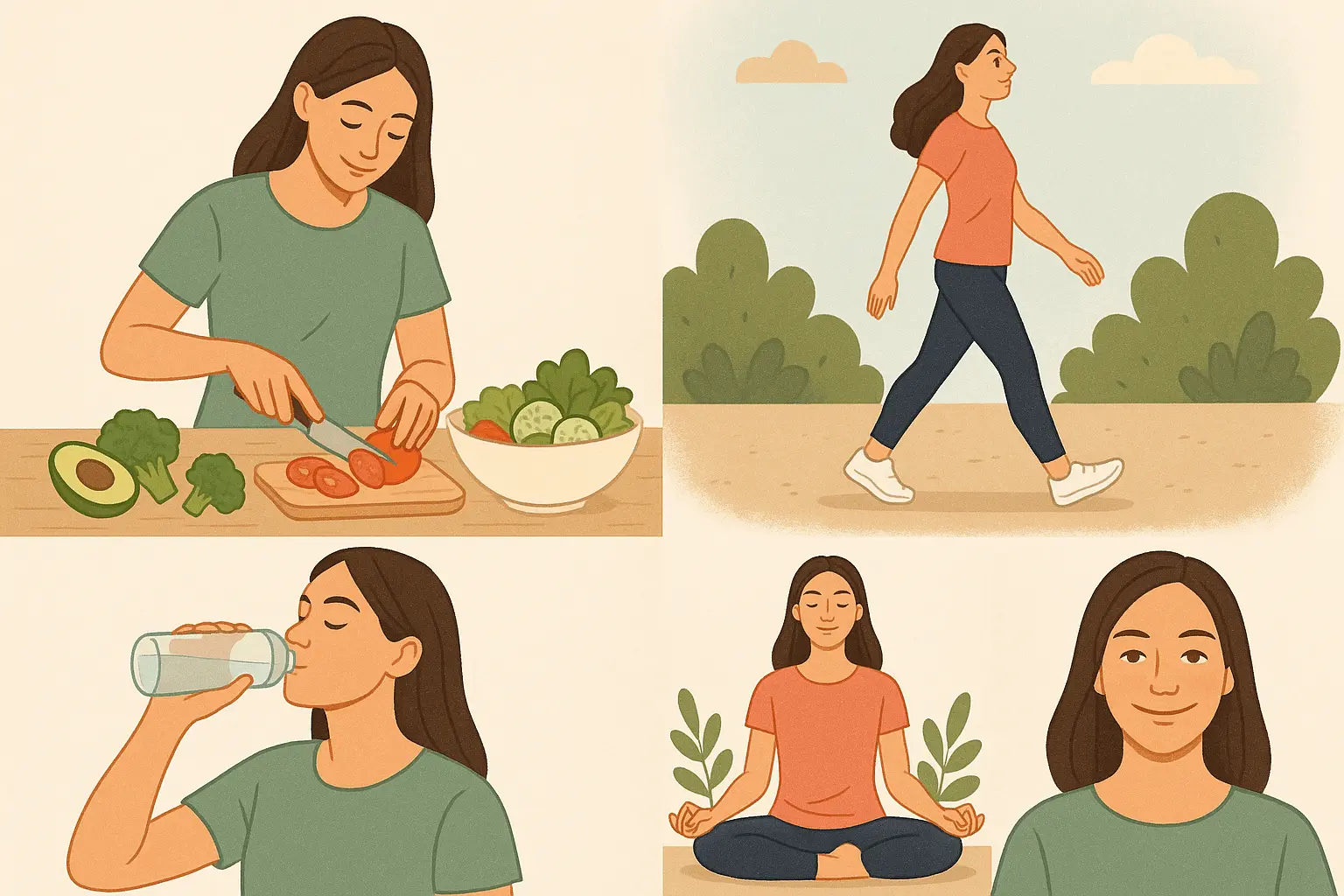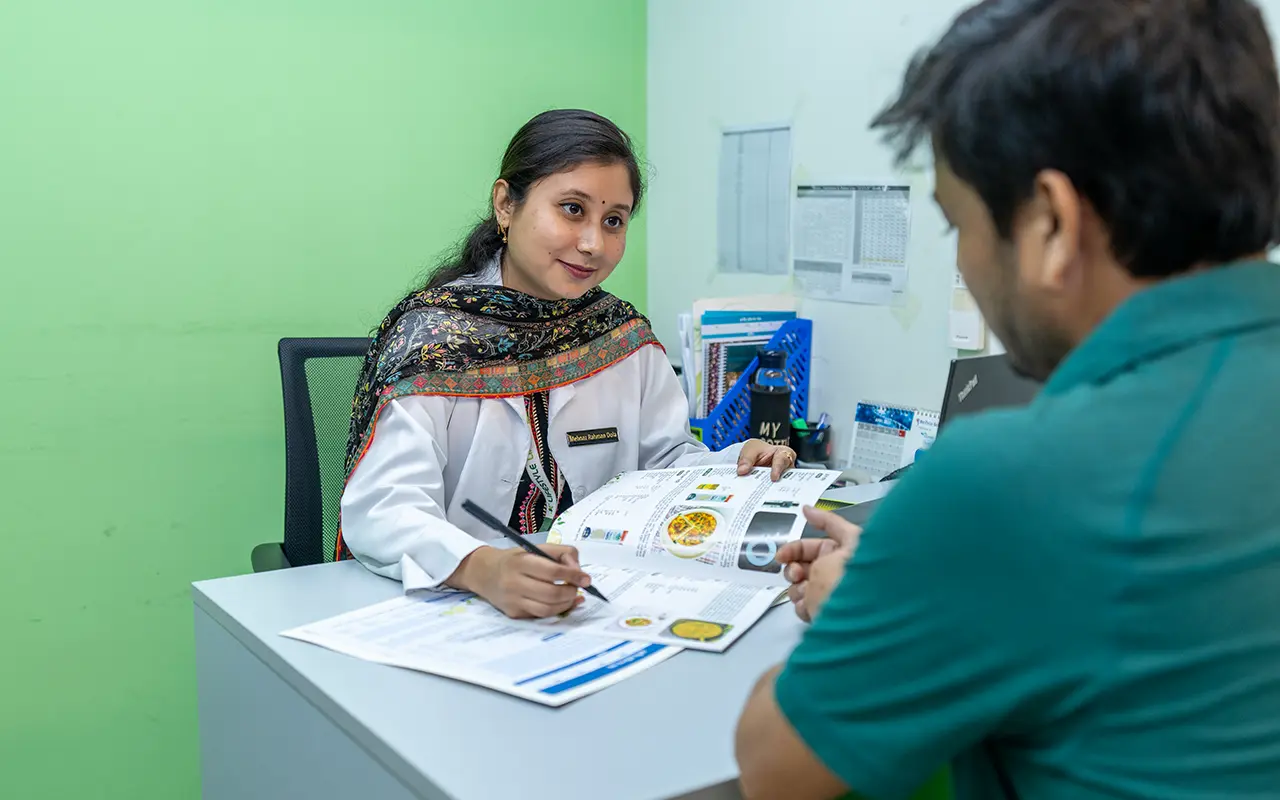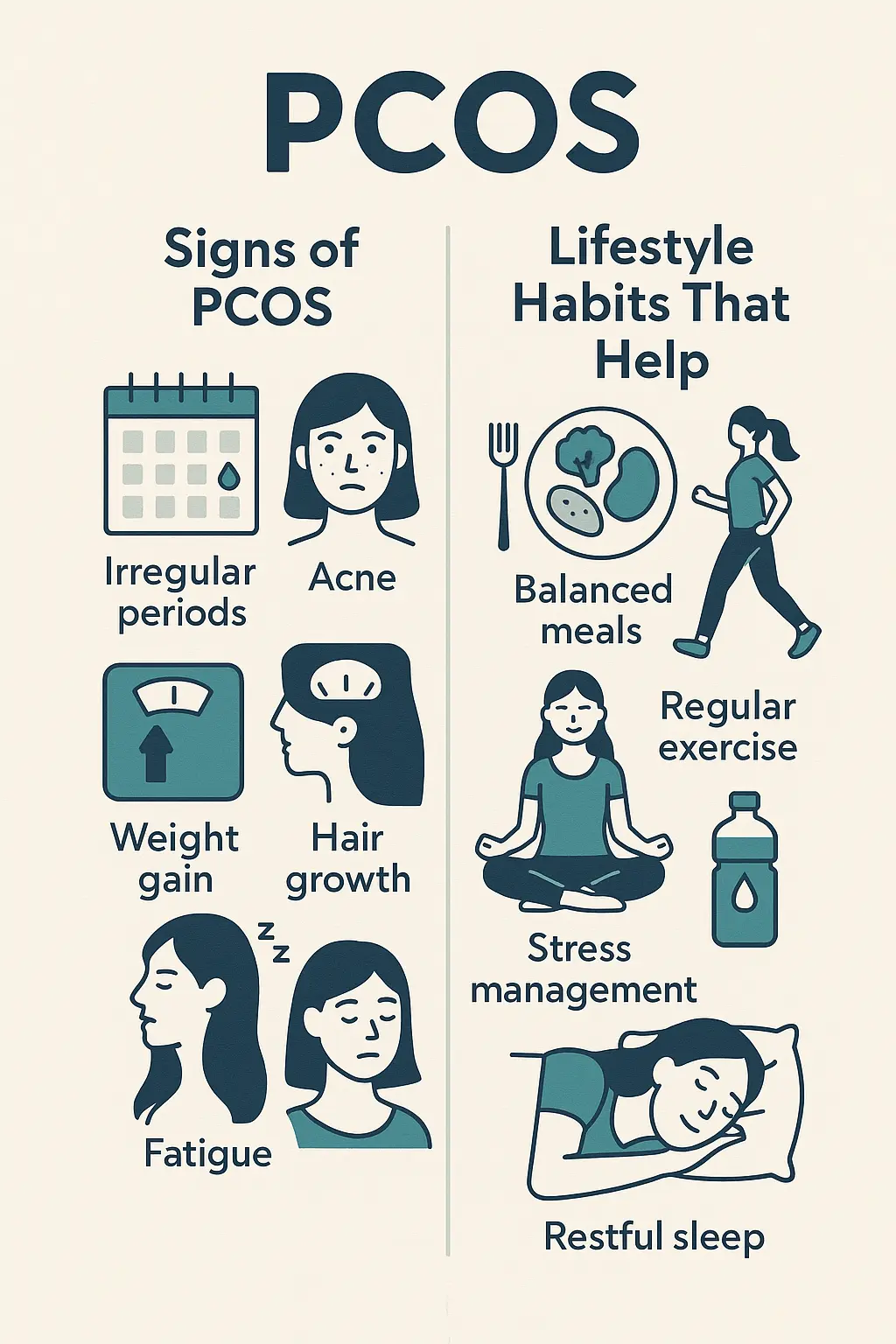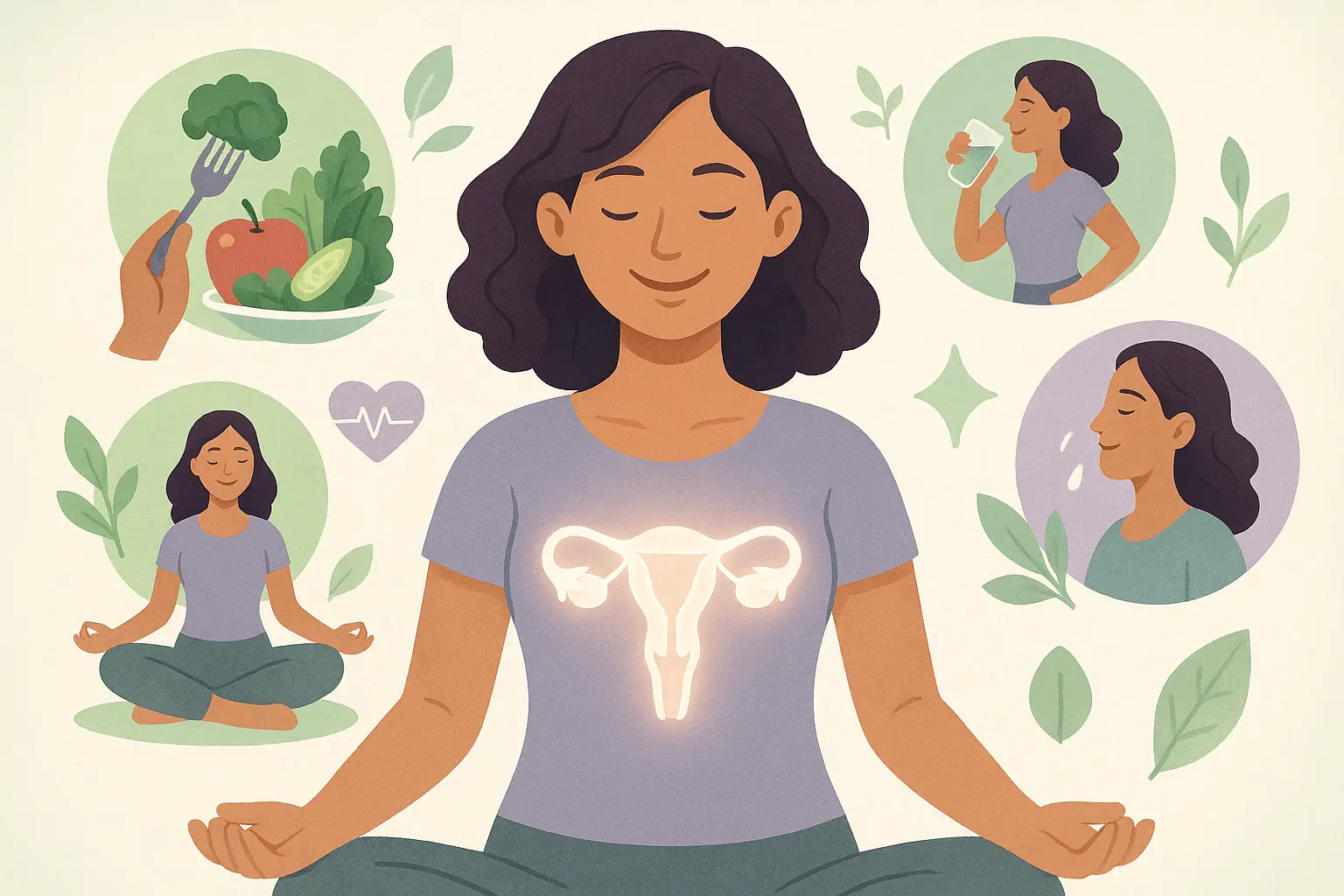PCOS Support & Organic Lifestyle Management – JK Lifestyle
Polycystic Ovary Syndrome (PCOS) is a hormonal condition that affects many women, often without them realizing it. It can cause irregular periods, weight changes, hair growth, acne, and fatigue—but not every woman experiences all these symptoms.
The subtle or irregular nature of PCOS means that many women may not recognize they have it until it starts affecting their health or fertility. This is why early awareness is so important.
Managing PCOS isn’t just about addressing symptoms—it’s about supporting your long-term reproductive health, maintaining balanced hormones, and improving overall well-being. Small, consistent lifestyle changes can make a significant difference in managing PCOS effectively.
How Do You Know You Have PCOS?
PCOS affects women differently, and symptoms can be subtle or irregular. Some common signs include:
Signs to Watch For:
| Symptom | What to Notice |
| Irregular periods | Missed cycles, late periods, very light or heavy flow |
| Weight fluctuations | Sudden gain or difficulty losing weight despite efforts |
| Excess hair growth | Unwanted hair on face, chest, or other areas |
| Acne or oily skin | Persistent breakouts that don’t improve easily |
| Fatigue | Feeling tired or low on energy regularly |
How JK Lifestyle Helps You Manage PCOS
Managing PCOS doesn’t have to be complicated. At JK Lifestyle, we focus on simple, practical lifestyle habits that support hormonal balance, improve energy levels, and promote overall health.
Balanced Meals and Mindful Eating
Healthy eating doesn’t mean strict diets. Focus on balanced meals with proper portions, incorporating vegetables, whole grains, and proteins. Reduce sugar gradually and use local herbs and spices to enhance flavor without extra salt or sugar. Mindful eating—paying attention to your meals and avoiding late-night snacking—can make a big difference.

Stay Active Daily
Incorporate physical activity into your routine in ways that feel natural. Walking to the local market, cycling in your neighborhood, practicing yoga or morning stretches (shalabhasana), or doing light exercises at home can help regulate hormones and support weight management.
Even 20–30 minutes a day is beneficial.

Manage Stress Effectively
Stress can worsen PCOS symptoms. Simple techniques like meditation, deep breathing exercises, prayer, or quiet reflection help calm the mind and support hormonal balance.
Integrating these practices into your daily life—even for a few minutes—can make a noticeable difference.

Prioritize Sleep and Hydration
Aim for 6–8 hours of restful sleep each night and drink water regularly throughout the day. Adequate sleep and hydration are essential for hormonal health and overall well-being.

Manage Stress Effectively
We emphasize building sustainable habits rather than relying solely on medication. Small, consistent changes in daily routines often lead to long-lasting improvements in PCOS management.

Manage Stress Effectively
Every woman’s experience with PCOS is unique. Dr. Jahangir Kabir offers free consultations to create a personalized lifestyle plan tailored to your daily routine and specific needs.

Simple Daily Routine Suggestions
Following a consistent daily routine can help manage PCOS symptoms effectively. Here’s an easy-to-follow example:
| Time of Day | Suggested Activities |
| Morning | Start your day with 10–20 minutes of light exercise, such as walking, stretching, yoga, or shalabhasana. Drink a glass of water to rehydrate your body. |
| Daytime | Focus on balanced meals with proper portions. Take short breaks to move around, like walking to the market or stretching at home/work. |
| Evening | Practice relaxation techniques such as deep breathing, meditation, or prayer. Prepare for 6–8 hours of restful sleep by limiting screen time and heavy meals before bed. |
Local Context & Cultural Tips
Managing PCOS becomes easier when lifestyle habits are tailored to your daily life in Bangladesh. Here are some practical tips:

Traditional Exercises
Incorporate familiar and culturally accessible activities into your routine:
- Morning stretches or shalabhasana: Gentle exercises at home can improve circulation and support hormonal balance.
- Yoga or light movement: Even 10–20 minutes daily helps manage weight, stress, and energy levels.
- Walking or cycling locally: Simple, everyday activities like walking to the local market or cycling around your neighborhood count as effective physical activity.
Practical Dietary Tips
Healthy eating doesn’t mean giving up flavor—small adjustments can make a big difference:
- Reduce sugar gradually: Limit sugary drinks, sweets, and desserts, replacing them with water or fruit in moderation.
- Mindful portion sizes: Eat slowly and pay attention to how full you feel, avoiding overeating.
- Use local herbs and spices: Flavor meals with coriander (dhonia), mint (pudina), turmeric, cumin, or lemon instead of extra sugar or salt.

Common Misconceptions About PCOS
Many women in Bangladesh and around the world misunderstand PCOS or assume that certain symptoms are “normal.” Clarifying these myths can help you take control of your health early:
- Myth 1: PCOS only affects overweight women
Truth: Women of all shapes and sizes can have PCOS. Weight is just one factor, and symptoms vary widely. - Myth 2: Irregular periods are normal
Truth: While periods can vary, consistently irregular cycles may indicate PCOS or other hormonal imbalances. Early detection and lifestyle management are important. - Myth 3: PCOS always causes infertility
Truth: Many women with PCOS can conceive naturally. Managing lifestyle factors like diet, exercise, stress, and sleep often improves reproductive health. - Myth 4: Medication is the only solution
Truth: While medication may help in some cases, lifestyle changes—like balanced meals, regular activity, stress management, and adequate sleep—play a crucial role in managing PCOS naturally.
Emotional & Mental Health Support
PCOS doesn’t just affect physical health—it can also impact mood, self-esteem, and overall mental well-being. Feeling anxious, stressed, or frustrated is common, but there are culturally relevant ways to cope:
- Mindfulness and Meditation: Short daily sessions of meditation or deep breathing help calm the mind and reduce stress.
- Prayer and Spiritual Practices: Many women find comfort and focus through prayer or quiet reflection, which can be an effective stress-relief tool.
- Social Support: Talking to family, friends, or support groups about your experiences can relieve emotional burden and provide motivation.
- Journaling: Keeping track of moods, symptoms, and lifestyle habits can help you understand patterns and celebrate progress.
Why Early Detection Matters
Noticing PCOS symptoms early can make a significant difference in both short-term and long-term health. Early detection allows you to take control through lifestyle changes, improving outcomes in several key areas:
- Better Fertility Outcomes: Managing PCOS early can help regulate menstrual cycles and improve chances of conception naturally.
- Reduced Risk of Diabetes and Heart Issues: Lifestyle changes such as balanced eating, regular exercise, and stress management can lower the risk of developing diabetes, high blood pressure, and heart problems later in life.
- Improved Energy and Well-Being: Early intervention supports hormone balance, helping reduce fatigue, improve mood, and increase overall vitality.
Conclusion
PCOS can be challenging, but small, consistent lifestyle changes can make a big difference in managing symptoms and improving overall health. Monitoring your menstrual cycle, staying active, eating mindfully, managing stress, and getting adequate sleep are simple yet powerful steps you can start today.
Take control of your health and begin your journey to PCOS management with expert guidance. Book a free consultation with Dr. Jahangir Kabir to create a personalized lifestyle plan tailored to your needs and daily routine.
For additional tips and easy-to-follow guidance, check out JK Lifestyle’s YouTube channel, where Dr. Kabir shares short videos on managing PCOS and building healthy habits.






